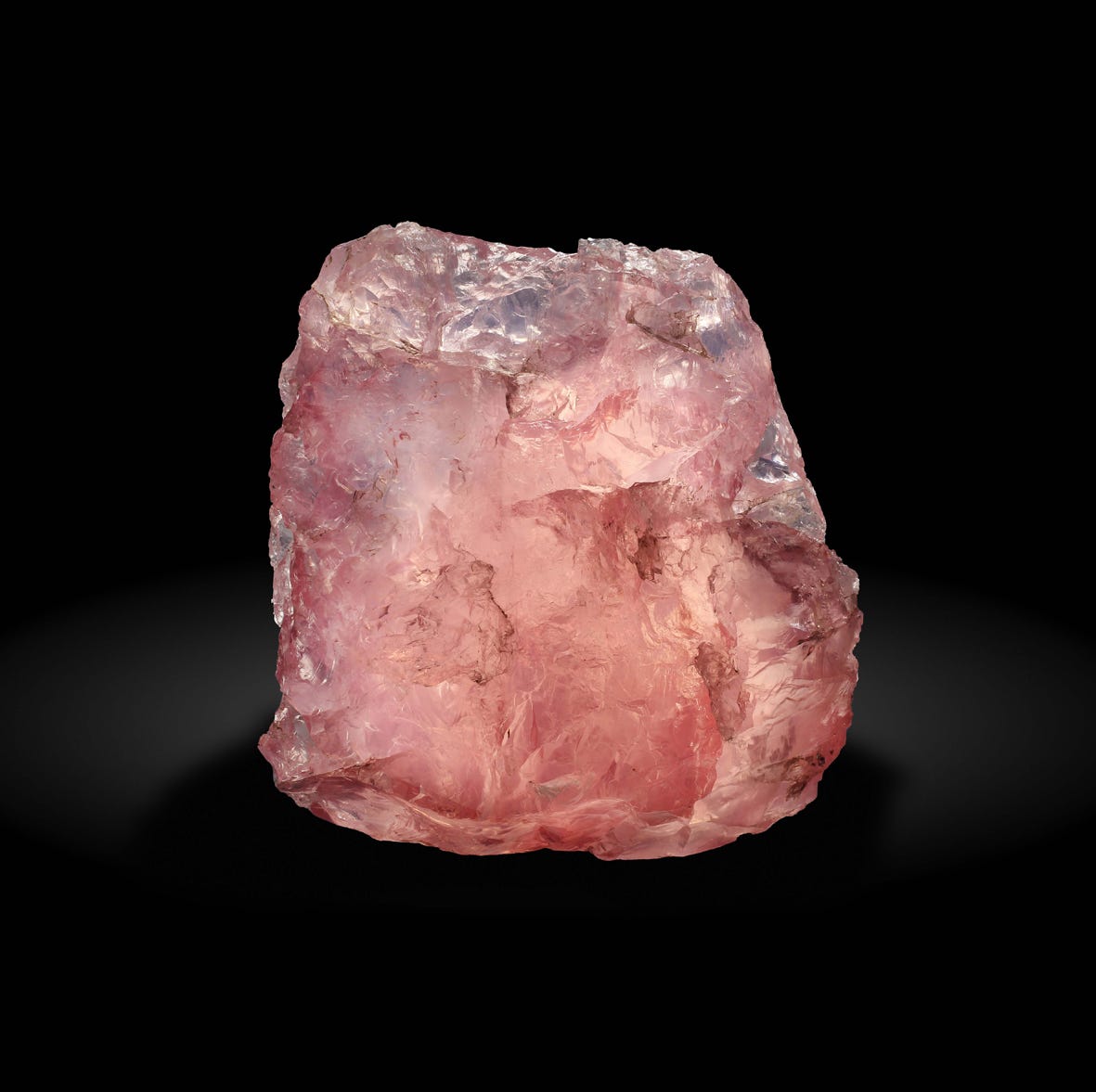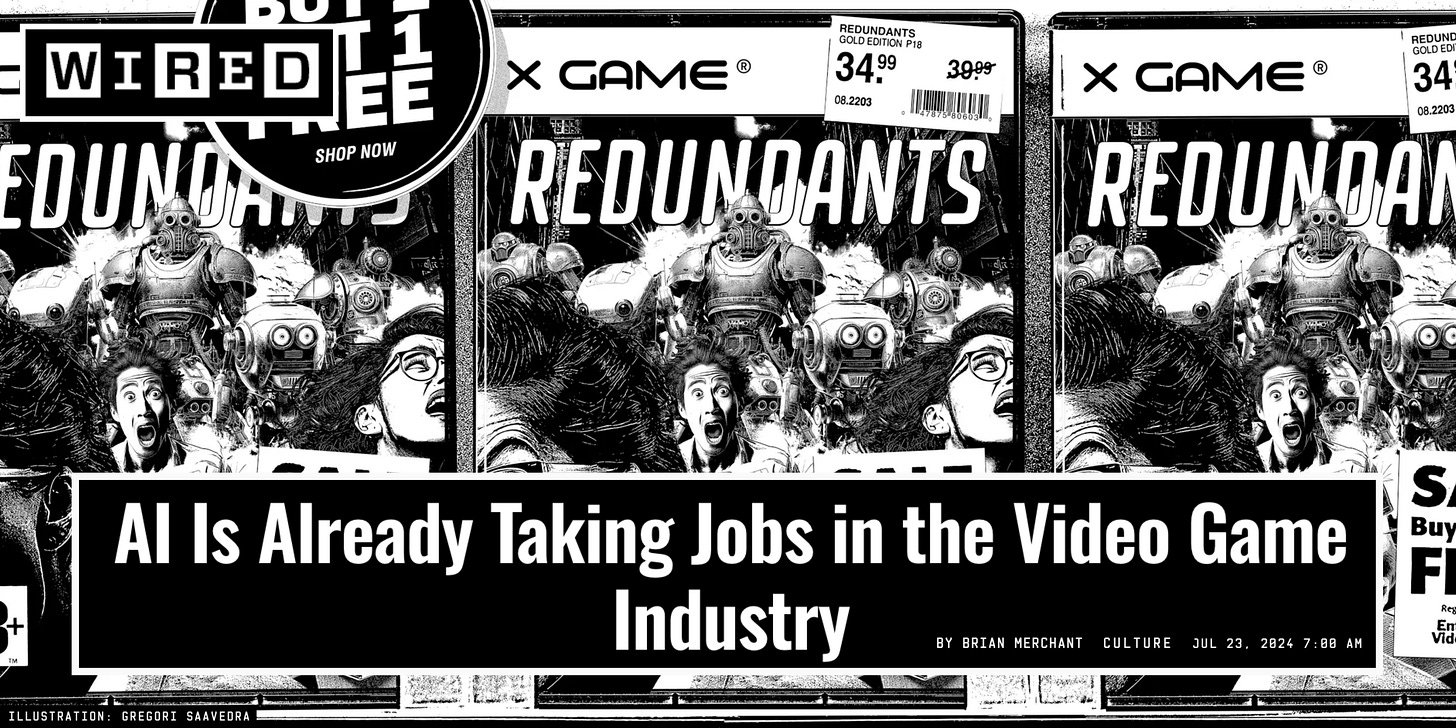The Cost of Our Semi-Precious Stones, AI Usurps Video Game Artists, and Human Nature Conversations
A Free Weekly Newsletter
The True Value of a Stone
It is a common trope that if we actually had to pay the true cost (i.e. the true ecological, social, labor, and material costs) for many of the things we buy, we probably wouldn’t own many things. The way our economic system works is to essentially disadvantage the primary producer by paying pennies for a raw material, adding value up the chain and inflating the price for consumers, while still keeping the price low enough that the average person can afford to buy. This allows the person at the end of the exchange — the one selling the product for the highest value — to bring in the most dividends.
This has always made little sense to me. If you take cocaine as an example, why is it that the producers (the farmers) make so little money compared to the drug lord? One could say it’s because the coca leaf must be processed, and moved to the consumers, thus adding value. It’s the process of wholesale. The drug lord is then responsible for the majority of the risk, getting the product to the consumer. But is he really? The coca farmer is at tremendous risk of being raided by warring cartels, getting busted by the government, and on and on. Should the farmer really be in poverty while a handful of people sit at the top with all of the money? Is that payment structure equitable?
Of course, not, Maren. These are drug lords we’re talking about.
But the way much of our economic system works is really no different, particularly when we’re talking about foreign goods. As you may be able to see in this documentary by German public broadcasting, DW, using the example of rose quartz, a popular semi-precious stone amongst young women, much of this comes down to power over the poor and people’s inability to provide for themselves outside of an exploitative, global economic system because of that system. It also comes down to distance and sight, and the fact that we in the West scarcely consider the true cost of the things we consume.
I’ve bought a lot of rose quartz in my life. I’ve made jewelry with it, or purchased it for love-lorn friends after a breakup. And each time I purchased it, I never once considered where it came from, who had to mine it, who profited off of the miner, who supplied it, how it got to me, or who gained off of the losses of those further back in the chain. If I saw it was from Madagascar, I probably just thought it was cool and exotic, not that it likely meant that a family utilizing their small children mined it for me for 10 cents a kilo. For reference, 1 kg of rose quartz is worth (from the consumers end) anywhere from $15 to $470 depending on the clarity of the stone. That’s 150 to 4,700 times the value paid to the miner. How much value can honestly be added to a rock?
As this film shows, much of our economic system relies on things being made invisible. We must invisiblize the children in the mines so we can have our rose quartz facial rollers without guilt (“worth” anywhere from $10 to $75 by the looks of it). Whether it’s rose quartz, clothing, avocados, cell-phones, computers, chocolate, or literally anything else we consume, there is a cost at the end of the chain that has been made deliberately invisible to us. There are people who suffer for our small, mindless luxuries. Swap out any product and you’ll find a similar story.
The film also highlights another troubling conundrum — one which is much more difficult for us to surmount: child labor is illegal in Madagascar. But laws cannot shield families from the poverty that makes them put their children in the mines. Laws do not feed their families. Companies who profit off of poverty need only turn the other cheek, claim they see nothing, and insist that they are doing their due diligence in the supply chain, as you already likely know if you’ve seen The Chocolate War featuring Terry Collingsworth.
Again, as with all issues in industrial civilization, the blame is diffuse and we are all entangled. I am culpable in the maintenance of unjust systems every day of my life. We all are. I don’t know how we as a culture, as a species, disentangle ourselves from this system, but if I can do nothing else but see it then I must see it. If I can do nothing else but help others see it, then I must help others see it. It’s not about guilt, and it’s not about shame. It’s about consciousness.
Perhaps that’s the only place we can start.
A.I. is Replacing Creatives First
In light of our recent podcast about the true history and meaning of the term “Luddite” and who they were, I do think it is important to continually point out this dynamic of industrial technologies being adopted by owner/operators which service to supplant the creative work of individuals, and highlight the ways that human displacement and dislocation has never stopped, only it has transformed — and it is very likely ramping up.
This article from Wired Magazine titled “AI Is Already Taking Jobs in the Video Game Industry” naturally caught my attention. The article describes the experience of what it is like to be an employee of a game industry right now, highlighting stories of anonymous employees expressing the anxiety they’re feeling as generative AI seeps into their field — and the disconnect between what the executives see as valuable compared to the employees.
“Where executives saw reason for excitement, many game artists, writers, and designers saw a direct threat to their livelihoods.”
This all smells like the exact same situation that the Luddites were in. The common people who have the least to gain from the profitability of the gaming industry — the individuals who do the day-to-day creative/artisan skills to make video games — feel threatened and “grief stricken” by their company’s embrace of AI, while the bosses, CEO’s, and executives of the industry only see profit opportunities. It’s the same old story — those in power neglecting who will be the cannon fodder for that profit.
One employee of a large video game company stated, “I felt that we were throwing away our humanity,” when he started to receive emails regarding the use of generative AI tools in the use of creating concept art for games. Again, this is of the same ilk as the Luddites. A large and established industry of humans creating and doing artistic things for humans as a valuable way of making a living for oneself, traded off for automation and profit for the very few. And while, ultimately, many people may not care about the video game industry, it’s important to remember that things like the video game industry are the canary in the coal mine for the rest of us. The easy pickings of creatives will always be the first victims in the modern world. But it will ultimately come for the rest of us, whether you are an accountant or a farmer.
The article estimates that around 10,500 people in 2023 were laid off in the video game industry. We’ve already seen 11,000 more people laid off in 2024, and we’re only a little over halfway through the year.
“Bosses are already using AI to replace and degrade jobs.”
It seems that right now the easiest jobs to replace in the industry similar to the film industry, which are 2D concept artists, which are the people who dothe creative conceptual ground-work before commencing with the much more expensive 3D assets and programming. A very valuable and creative job nonetheless. Because it is easy to have one of these AI image generators create an OK image en masse and then have someone polish it up, these are the first jobs to be replaced.
“Remaining concept artists were then forced to use AI to aid in their work,” Wired reporter Brian Merchant writes. He continues, describing how employees have been made to sign up for AI trainings and its use is being promoted throughout the organization.
Again — so similar to what happened to the Luddites. The weavers who lost the war against the factory owners were forced to learn how to be payed exponentially less, to work in the factories, doing menial, dehumanizing tasks for the lowest pay possible: all while making a sub-par product that they were once doing in the freedom of their own cottages. Here we have history echoing itself in the video game industry, artists being forced to do a lower quality version of the craft and being turned into the “cleaners” or “fixers” of what machines produce. Degrading indeed.
This is the continuation of what the industrial revolution has always been and will continue to be: the process of dominating, order, and controlling, of nature and therefore humans. AI to me represents not some new frontier, but rather the extremis of what our civilization has always been about. It is the enacting of the story that has occupied our planet. It is truly symbolic in a way and will do nothing but serve to de-humanize and degrade us and the rest of the living world.
You may not care much about video games, but they are true sanctuaries for artists and creatives, as video games are one of the only viable creative fields of our time. They have supported scores of people around the globe to live a life as artists, and now it is plain to see that the machine is coming for them, and by extension, all creative fields. Creative fields of any kind are where culture is formed, and now the culture will be formed by machines.
Long live Ned Ludd.
Death in the Regenerative Garden: Rethinking Food, Farming, and the Cycle of Life
Please check out our friend Alex’s podcast, Human Nature Odyssey in this new format exploring important topics through conversations. In this podcast, we are featured alongside Mandy MaGill, cofounder of Earth Regeneration Alliance and Rooted in REAL — an upcoming app that will help educate and guide people towards foods that are REAL (regenerative, ethical, authentic, and local), as well as connecting them to likeminded community.
It is an honor to be highlighted in this podcast alongside Mandy. And as always, Alex’s skills as a podcaster are unmatched.
Thank you for your attention. If you’d like to support the project and gain access to future full podcasts, essays, and videos without ads, and be able to comment on posts, please consider becoming a paid subscriber or joining us on Patreon for as little as $5 a month.









